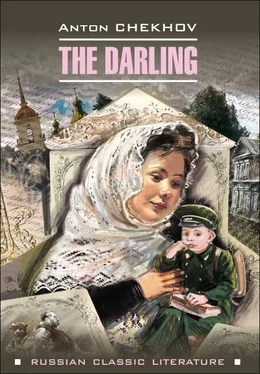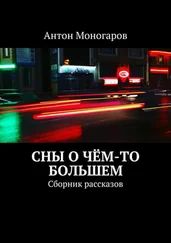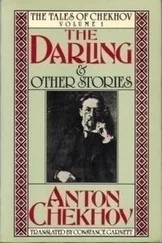Антон Чехов - The darling / Душечка. Сборник рассказов
Здесь есть возможность читать онлайн «Антон Чехов - The darling / Душечка. Сборник рассказов» — ознакомительный отрывок электронной книги совершенно бесплатно, а после прочтения отрывка купить полную версию. В некоторых случаях можно слушать аудио, скачать через торрент в формате fb2 и присутствует краткое содержание. Год выпуска: 2019, ISBN: 2019, Издательство: Литагент Каро, Жанр: Классическая проза, Русская классическая проза, Прочая научная литература, на английском языке. Описание произведения, (предисловие) а так же отзывы посетителей доступны на портале библиотеки ЛибКат.
- Название:The darling / Душечка. Сборник рассказов
- Автор:
- Издательство:Литагент Каро
- Жанр:
- Год:2019
- ISBN:978-5-9925-1149-9
- Рейтинг книги:5 / 5. Голосов: 1
-
Избранное:Добавить в избранное
- Отзывы:
-
Ваша оценка:
- 100
- 1
- 2
- 3
- 4
- 5
The darling / Душечка. Сборник рассказов: краткое содержание, описание и аннотация
Предлагаем к чтению аннотацию, описание, краткое содержание или предисловие (зависит от того, что написал сам автор книги «The darling / Душечка. Сборник рассказов»). Если вы не нашли необходимую информацию о книге — напишите в комментариях, мы постараемся отыскать её.
The darling / Душечка. Сборник рассказов — читать онлайн ознакомительный отрывок
Ниже представлен текст книги, разбитый по страницам. Система сохранения места последней прочитанной страницы, позволяет с удобством читать онлайн бесплатно книгу «The darling / Душечка. Сборник рассказов», без необходимости каждый раз заново искать на чём Вы остановились. Поставьте закладку, и сможете в любой момент перейти на страницу, на которой закончили чтение.
Интервал:
Закладка:
At night Yulia Sergeyevna read the evening prayers attentively then knelt down, and pressing her hands to her bosom, gazing at the flame of the lamp before the ikon, said with feeling:
“Give me understanding, Holy Mother, our Defender! Give me understanding, O Lord!”
She had in the course of her life come across elderly maiden ladies, poor and of no consequence in the world, who bitterly repented and openly confessed their regret that they had refused suitors in the past. Would not the same thing happen to her? Had not she better go into a convent or become a Sister of Mercy?
She undressed and got into bed, crossing herself and crossing the air around her. Suddenly the bell rang sharply and plaintively in the corridor.
“Oh, my God!” she said, feeling a nervous irritation at the sound. She lay still and kept thinking how poor this provincial life was in events, monotonous and yet not peaceful. One was constantly having to tremble, to feel apprehensive, angry or guilty, and in the end one’s nerves were so strained, that one was afraid to peep out of the bedclothes.
A little while afterwards the bell rang just as sharply again. The servant must have been asleep and had not heard. Yulia Sergeyevna lighted a candle, and feeling vexed with the servant, began with a shiver to dress, and when she went out into the corridor, the maid was already closing the door downstairs.
“I thought it was the master, but it’s some one from a patient,” she said.
Yulia Sergeyevna went back to her room. She took a pack of cards out of the chest of drawers, and decided that if after shuffling the cards well and cutting, the bottom card turned out to be a red one, it would mean yes – that is, she would accept Laptev’s offer; and that if it was a black, it would mean no . The card turned out to be the ten of spades.
That relieved her mind – she fell asleep; but in the morning, she was wavering again between yes and no , and she was dwelling on the thought that she could, if she chose, change her life. The thought harassed her, she felt exhausted and unwell; but yet, soon after eleven, she dressed and went to see Nina Fyodorovna. She wanted to see Laptev: perhaps now he would seem more attractive to her; perhaps she had been wrong about him hitherto …
She found it hard to walk against the wind. She struggled along, holding her hat on with both hands, and could see nothing for the dust.
IV
Going into his sister’s room, and seeing to his surprise Yulia Sergeyevna, Laptev had again the humiliating sensation of a man who feels himself an object of repulsion. He concluded that if after what had happened yesterday she could bring herself so easily to visit his sister and meet him, it must be because she was not concerned about him and regarded him as a complete nonentity. But when he greeted her, and with a pale face and shadows under her eyes she looked at him mournfully and remorsefully, he saw that she, too, was miserable.
She did not feel well. She only stayed ten minutes, and began saying good-bye. And as she went out she said to Laptev:
“Will you see me home, Alexey Fyodorovitch?”
They walked along the street in silence holding their hats, and he, walking a little behind, tried to screen her from the wind. In the lane it was more sheltered, and they walked side by side.
“Forgive me if I was not nice yesterday;” and her voice quavered as though she were going to cry. “I was so wretched! I did not sleep all night.”
“I slept well all night,” said Laptev, without looking at her; “but that doesn’t mean that I was happy. My life is broken. I’m deeply unhappy, and after your refusal yesterday I go about like a man poisoned. The most difficult thing was said yesterday. To-day I feel no embarrassment and can talk to you frankly. I love you more than my sister, more than my dead mother … I can live without my sister, and without my mother, and I have lived without them, but life without you is meaningless to me; I can’t face it …”
And now too, as usual, he guessed her intention.
He realised that she wanted to go back to what had happened the day before, and with that object had asked him to accompany her and now was taking him home with her. But what could she add to her refusal? What new idea had she in her head? From everything, from her glances, from her smile, and even from her tone, from the way she held her head and shoulders as she walked beside him, he saw that as before she did not love him, that he was a stranger to her. What more did she want to say?
Doctor Sergey Borisovitch was at home.
“You are very welcome. I’m always glad to see you, Fyodor Alexeyitch,” he said, mixing up his Christian name and his father’s. “Delighted, delighted!”
He had never been so polite before, and Laptev saw that he knew of his proposal; he did not like that either. He was sitting now in the drawing-room, and the room impressed him strangely with its poor, common decorations, its wretched pictures, and though there were armchairs in it, and a huge lamp with a shade over it, it still looked like an uninhabited place, a huge barn, and it was obvious that no one could feel at home in such a room, except a man like the doctor. The next room, almost twice as large, was called the reception room, and in it there were only rows of chairs, as though for a dancing class. And while Laptev was sitting in the drawing-room talking to the doctor about his sister, he began to be tortured by a suspicion. Had not Yulia Sergeyevna been to his sister Nina’s, and then brought him here to tell him that she would accept him? Oh, how awful it was! But the most awful thing of all was that his soul was capable of such a suspicion. And he imagined how the father and the daughter had spent the evening and perhaps the night before, in prolonged consultation, perhaps dispute, and at last had come to the conclusion that Yulia had acted thoughtlessly in refusing a rich man. The words that parents use in such cases kept ringing in his ears:
“It is true you don’t love him, but think what good you could do!”
The doctor was going out to see patients. Laptev would have gone with him, but Yulia Sergeyevna said:
“I beg you to stay.”
She was distressed and dispirited, and told herself now that to refuse an honourable, good man who loved her, simply because he was not attractive, especially when marrying him would make it possible for her to change her mode of life, her cheerless, monotonous, idle life in which youth was passing with no prospect of anything better in the future – to refuse him under such circumstances was madness, caprice and folly, and that God might even punish her for it.
The father went out. When the sound of his steps had died away, she suddenly stood up before Laptev and said resolutely, turning horribly white as she did so:
“I thought for a long time yesterday, Alexey Fyodorovitch … I accept your offer.”
He bent down and kissed her hand. She kissed him awkwardly on the head with cold lips.
He felt that in this love scene the chief thing – her love – was lacking, and that there was a great deal that was not wanted; and he longed to cry out, to run away, to go back to Moscow at once. But she was close to him, and she seemed to him so lovely, and he was suddenly overcome by passion. He reflected that it was too late for deliberation now; he embraced her passionately, and muttered some words, calling her thou ; he kissed her on the neck, and then on the cheek, on the head …
She walked away to the window, dismayed by these demonstrations, and both of them were already regretting what they had said and both were asking themselves in confusion:
“Why has this happened?”
Читать дальшеИнтервал:
Закладка:
Похожие книги на «The darling / Душечка. Сборник рассказов»
Представляем Вашему вниманию похожие книги на «The darling / Душечка. Сборник рассказов» списком для выбора. Мы отобрали схожую по названию и смыслу литературу в надежде предоставить читателям больше вариантов отыскать новые, интересные, ещё непрочитанные произведения.
Обсуждение, отзывы о книге «The darling / Душечка. Сборник рассказов» и просто собственные мнения читателей. Оставьте ваши комментарии, напишите, что Вы думаете о произведении, его смысле или главных героях. Укажите что конкретно понравилось, а что нет, и почему Вы так считаете.












